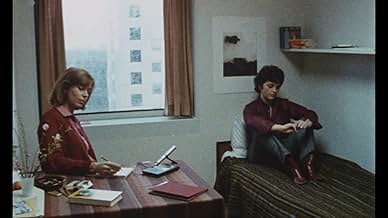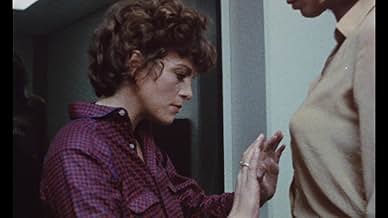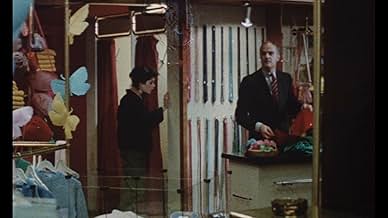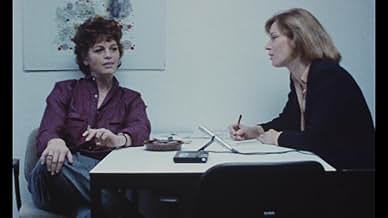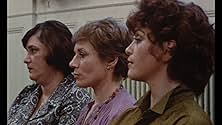IMDb RATING
6.7/10
1.3K
YOUR RATING
Three women of no previous acquaintance suddenly kill a male shopkeeper in the middle of the day. The female psychiatrist assigned to the case sets out to understand why.Three women of no previous acquaintance suddenly kill a male shopkeeper in the middle of the day. The female psychiatrist assigned to the case sets out to understand why.Three women of no previous acquaintance suddenly kill a male shopkeeper in the middle of the day. The female psychiatrist assigned to the case sets out to understand why.
- Awards
- 3 wins & 2 nominations total
Eddie Brugman
- Echtgenoot
- (as Eddy Brugman)
- Director
- Writer
- All cast & crew
- Production, box office & more at IMDbPro
Featured reviews
I just watched this film for a law class and wanted to briefly defend it, in light of the previously posted comment by another user.
I think the comparison of feminist reaction to male dominance in this movie, with anti-Semitism of the Nazi era, is inappropriate and not logically founded. Anti-Semitism and Jewish persecution in Nazi Germany was an example of social/religious bigotry, intolerance, and violence perpetrated by the political majority against a political and religious minority. It was based on a history of escalating persecution spanning centuries. By contrast, this movie concerns the emergent hostile sentiments of a social/political minority group, to their perceived oppression by the social/political majority.
The movie dates from the 1980's and perhaps both suffers and benefits from this fact -- it looks somewhat dated, but the social climate of that era is important to understanding the movie. Europe of the 1970s and 1980s, much like the US, was still very resistant to even the idea that sexism really existed or was a problem. The courts were actively fleshing out the parameters of sexual rights and protections -- legally carving out the nuances of sexual harassment, sex discrimination, and reproductive choice law.
The film is basically an extended commentary, arguably controversial, on the repression of women in a male dominated society. In this regard, the message is possibly too strongly stated -- three women, having finally had enough of silently accepting sexism and male domination, suddenly snap and brutally murder a male sales clerk in cold blood. They feel no remorse, and no men in the movie can even begin to comprehend the very idea of sexism or its effect on women. However, to compare the feminist sentiments of the film to Nazi-ism, is not only unfair, but is an offensive and reactionary over-statement of disagreement with these same feminist sentiments.
I think the comparison of feminist reaction to male dominance in this movie, with anti-Semitism of the Nazi era, is inappropriate and not logically founded. Anti-Semitism and Jewish persecution in Nazi Germany was an example of social/religious bigotry, intolerance, and violence perpetrated by the political majority against a political and religious minority. It was based on a history of escalating persecution spanning centuries. By contrast, this movie concerns the emergent hostile sentiments of a social/political minority group, to their perceived oppression by the social/political majority.
The movie dates from the 1980's and perhaps both suffers and benefits from this fact -- it looks somewhat dated, but the social climate of that era is important to understanding the movie. Europe of the 1970s and 1980s, much like the US, was still very resistant to even the idea that sexism really existed or was a problem. The courts were actively fleshing out the parameters of sexual rights and protections -- legally carving out the nuances of sexual harassment, sex discrimination, and reproductive choice law.
The film is basically an extended commentary, arguably controversial, on the repression of women in a male dominated society. In this regard, the message is possibly too strongly stated -- three women, having finally had enough of silently accepting sexism and male domination, suddenly snap and brutally murder a male sales clerk in cold blood. They feel no remorse, and no men in the movie can even begin to comprehend the very idea of sexism or its effect on women. However, to compare the feminist sentiments of the film to Nazi-ism, is not only unfair, but is an offensive and reactionary over-statement of disagreement with these same feminist sentiments.
This film is NOT anti-male. It is not suggesting that women go out and randomly kill men just for being of that gender. What is does do is use a wonderful technique called reversal. If three men had brutalized a woman, well, "society" might not find that so shocking (maybe more now than earlier years, but certainly not as shocking as the reverse). It doesn't want to start propaganda, it wants to make you THINK. By making the therapist think on it, it forces the viewer to think on it as well. What's the history of women being brutalized and then remaining quiet about it? Have women really achieved the social, political, and economic equality that is the feminist goal? Why not? This movie doesn't hate men; it simply loves women enough to give everyone something to think about.
Very powerful and thoughtful. Much superior to Gorris' more-acclaimed Antonia's Line, in my opinion. This film has none of the cutesiness of Antonia but all of the thoughtfulness and thematic weight. The theme is a subtle examination of the roles of men and women in Dutch society, and I guess it could apply to many societies. The film has a viewpoint, but it problematizes and complicates matters so that it's impossible for the viewer to blindly accept that viewpoint. It examines SUBTLE discrimination and dehumanization.
The only frustration I had was the fact that the copy I viewed did not give subtitles to a lot of the dialogue--e.g., a woman listens to the radio for about a minute, but non-Dutch speakers (like myself) don't understand any of it, and I'm guessing that with a filmmaker as careful as Gorris, this dialogue is important.
The only frustration I had was the fact that the copy I viewed did not give subtitles to a lot of the dialogue--e.g., a woman listens to the radio for about a minute, but non-Dutch speakers (like myself) don't understand any of it, and I'm guessing that with a filmmaker as careful as Gorris, this dialogue is important.
Reminiscent of the play/short story/film, A Jury of her Peers, written by Susan Gaskel-a contemporary of Eugene O'Neill's who was way more popular than O'Neill at the time, much to O'Neill's dismay.
To call this movie hate literature is one thing, but the analogy used referencing Jews and Nazis is completely not applicable here. This is a film about power, domination, and oppression, all three of which men exercise over women in our society. One would have to live in a bubble to say that Jews hold the same position over non-Jews or Nazis (or did pre-WWII)! As a Jew, I find your comment mildly offensive, and as a man (while it is always difficult to recognize one's privilege), I find this film to be an amazing critique of patriarchy. While murder may not be the solution, this film shows the extraordinary way in which 3 women who have been beaten down their whole lives (and have nothing to lose) attempt to fight back against an enemy that is unbeatable. The laughter at the end of this film proves just who gets it and who doesn't. PS- I've heard that in some places during the initial screenings of this film, women in the theaters actually broke out in laughter with the women on screen during the court scene....
Did you know
- TriviaThe first plant that Nelly Frijda throws during her tantrum can be seen hitting the lens of the camera.
- How long is A Question of Silence?Powered by Alexa
Details
- Release date
- Country of origin
- Languages
- Also known as
- A Question of Silence
- Production company
- See more company credits at IMDbPro
Box office
- Budget
- NLG 300,000 (estimated)
Contribute to this page
Suggest an edit or add missing content

